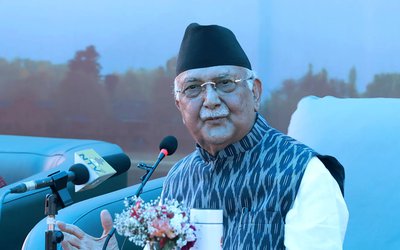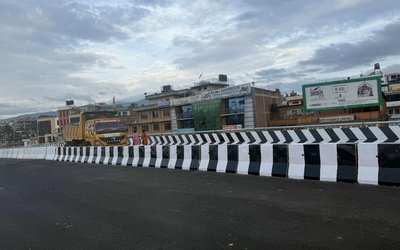More on News






1. Introduction
Safe drinking water and cleanliness are fundamental necessities of human life. The development of a safe drinking water and sanitation will have a positive impact on the health of the consumers creating a healthy human resource and aiding in other productive sectors of the country. The proper use of safe drinking water prevents the spread of waterborne diseases and reduces the need for investments in health services. By saving the time taken to fetch water it will make more time available for other more productive works, adding to income generation, and reducing healthcare costs thus lending a major helping hand to the country’s aim of alleviating poverty.
2. Current scenario of access/import of drinking water in rural areas
Keeping in mind that the proper development of drinking water and sanitation, a fundamental necessity of human life, can aid in the social and economic progress of the country and positively affect public health, it is the fundamental duty and responsibility of the state to ensure that all Nepali people get easy access to safe and adequate drinking water.
A large portion of Nepal’s population still does not have easy access to adequate safe drinking water. People living in the hills and mountains still use water from springs, wells, ponds, canals, rivers and streams, which are mostly unsafe for drinking. Because water has to be fetched from long distances after walking many uphill’s and downhills the use of water itself is limited to the bare minimum needed to sustain life. In the flatlands of the Tarai although there are underground water resources but in most cases the water from these underground sources are also not safe.
At the end of the 9th Plan the state of beneficiaries of drinking water supply service in the rural areas was as follows:
Eastern region: 291761
Mid region: 425165
Western region: 321679
Mid-western region: 228480
Far western region: 171985
Total: 1438771
Various sources have showed that at an average 10,500 children die of water borne diseases such as dysentery in Nepal every year due to lack of safe drinking water and proper sanitation. A large portion of the adult population is also losing many productive working days due to water borne diseases. Although 80 % of the population have access to drinking water and 43 % have access to sanitation services there has been no interest in supplying safe quality drinking water as per the basic standards set by drinking water projects. Whatever else is shown in statistics the truth remains that only a small portion of Nepal’s rural population has access to safe drinking water.
National Policy on Rural Drinking Water and Sanitation, 2060
The Nepal Government seems committed to provide basic level drinking water supply to the entire population, keeping in mind that safe drinking water and sanitation contribute to the socio – economic development of the country and safe guard the health of the public. As mentioned in the 10th Plan, the aim is to be able to provide safe drinking water and sanitation services to the entire population within the time frame of the 12th plan. It has therefore become necessary to form general and specific work policies to direct future projects for the development of safe drinking water and sanitation services, recognizing those projects that follow principles of participatory processes that are sustainable and reliable.
Strategic Work Plans for Rural Drinking Water and Sanitation, 2060
Regional strategy and work plans have been prepared to make financial aid available for rural drinking water supply and sanitation services as per the current overall scenario and the goals of the 10th plan, on the basis of estimated required investments to fulfill the demand for rural drinking water supply and sanitation.
This regional strategic workplan proposes an optimal organizational mechanism, learning from past regional experiences and keeping the service provider mechanisms in mind, which clearly defines the roles and responsibilities of primary stakeholders, effective import of rural drinking water and sanitation services, and emphasis on correction in personal hygiene. This has also included strategies to recognize the special role and involvement of women, backward castes and ethnic communities and alleviate poverty.
Introduction of Rural Drinking Water and Sanitation Fund Development Committee
The Nepal Government established the Development Committee Act, 2013 on 14 March 1996 with the purpose of creating policy level assistance to allow for the basic transformation of the traditional import system, making it demand driven and based on economic participatory concepts, to allow proper income generating productive utilization of the time saved by women when not having to fetch drinking water through which the rural communities can be socially and economically empowered. This has been called “Fund board” in short. This is a well-known established institution that has been active in taking services to the people of the rural areas of Nepal. Its effectiveness did not decrease even during the days of the armed insurgency and conflict. Its working process that involves participation of consumers from the community level to project selection and implementation is very praiseworthy. State agencies have spoken proudly of this institutions work amongst all the progresses made since the first Peoples Movement. In todays changed context if legal provisions can be made to enable it to be organized and autonomous it will definitely make important contributions in enabling the rural population to get access to safe drinking water and sanitation.
Recommendations and Suggestions for the proposed bill
The following recommendations and suggestions have been made related to the “Bill made to manage the Rural Drinking Water and Sanitation Solution Fund” presented before the Legislative Parliament, to establish the Rural Drinking Water and Sanitation Fund Development Committee, which has been enabling rural communities all over Nepal since 2052 BS, to consistently get access to safe drinking water and sanitation facilities in a reliable, sustainable, safe and economic manner, as continually accountable autonomous organized institution.
Preamble
As non-government agencies play an important role in drinking water and sanitation projects that are implemented by the Rural Drinking Water and Sanitation Fund Development Committee from the initial development to implementation phase, the preamble of the proposed bill should mention that the assisting agency can also be an NGO, i.e. like local consumers and agencies.
Definition
In place of the word “plan” mentioned in ( e) of this title, it might be more appropriate to use the phrase “different types of plans”.
Likewise in ( F ) under the sub heading “assisting organization” in place of “ “organized institutions established as per prevalent laws” it might be more practical to mention “organized non-government organizations and other organizations”.
Establishment of the Fund
Instead of emphasizing on the effective implementation of existing structures, the trend is to create newer structures and misuse the available financial resources for personal benefit. Therefore instead of the proposed provision where it says “the fund may open its branch offices in any place in Nepal as per its necessity” mentioned in 2 of the same heading, it might be more appropriate to say “only permissible to open if it is necessary, significant, useful, and financially viable.”
Committee Formation
If the proposed Rural Drinking Water and Sanitation Development Fund as are to be effective development fund, regarding the formation of the committee, keeping the current proposed provision of Nepal Government appointing three members to the board, the following must also be included in the committee to make it more effective:
Secretary, Physical Planning and Works Ministry- member
Secretary, Local Development Ministry – member
Secretary, Health Ministry – member
Chair, District Development Committee Federation – member
Chair, Village Development Committee National Federation – member
As it has been many years since there have been any local election leaving posts in the local agencies vacant and as many changes have also occurred in the political scenario of the country, an alternative may be thought of, in place of the VDC National Federation and DDC Federation representatives.
Likewise as many of the municipalities are no better off than VDCs requiring drinking water and sanitation programmes even in the municipalities, it might be appropriate to have provisions allowing representatives from municipality bodies in the committee.
Under sub section 5, and 6 of the same heading, instead of the nominated members and chair having a term of two and three years respectively it will be better to have both serve equal terms of three years each.
Executive Director
In place of the provision allowing the government to appoint a senior level employee of the Fund as the Executive Director for a maximum of 6 months, until one is appointed as per Article 16 sub section 4, it might be practically and ideologically appropriate to have a provision to allow the committee itself to appoint an Executive Director for a maximum of 6 months, from within the committee itself.
After presenting its recommendation and suggestions regarding the proposed bill in detail, emphasizing the importance of the proposed bill, the organization requests that the Legislature Parliament keep the following points in mind when passing the proposed bill.
• At a time when there is a need for an organized autonomous agency to provide safe drinking water and sanitation in an effective manner to 84 % of the population who live in the rural areas of Nepal, it is of outmost importance that this bill be made into a law.
• If the goal of making safe drinking water and sanitation, a basic right, to all Nepalis within 2017 is to be achieved the bill must be passed.
• In the context of the regional strategic work plan proposing an optimal organizational mechanism, taking into account past experiences and keeping the service delivery mechanisms in mind, as per the Rural Drinking Water and Sanitation Regional Work Plan, 2060, to present the Rural Drinking Water and Sanitation Fund Development Committee” an organized and autonomous institution, this bill must be passed to fulfill the long term objectives.
• No bill or law is complete on its own. The specialty about law is that it allows space for necessary corrections in the future with learnings from past experiences, through amendments. In this context, as the bill, even if it is passed in its present form can prepare important organizational structures for rural drinking water and sanitation services; it must be passed as soon as possible. There are no significant weaknesses in the proposed bill either. It will be beneficial to the country and people to pass the bill as soon as possible, allowing for amendments in the future based on experiential learning and the necessity.
Safe drinking water and sanitation are the fundamental basis for the development of human society. The main challenges here are to increase the service areas of drinking water and sanitation services as well as its quality and supply as per demand. The Rural Drinking Water and Sanitation Fund Development Committee has been working effectively and efficiently for the last 15 years. If the goal of increasing the service area and quality and taking safe drinking water and sanitation services to all Nepalis within the year 2017 is to be met the Legislative Parliament must pass the Bill Made to Establish the Rural Drinking Water and Sanitation Development Fund, Act 2066, as soon as possible.
This investigation and recommendation was prepared by Professor Ganesh Dutta Bhatta for the Nepal Constitution Foundation with inputs from women, indigenous communities, Madhesi, youth and other pressure groups. The Foundation is grateful to Bharat Gautam, Dinesh Tripathi, Pradip Kumar Rajkbanshi, Indra Kumar Sodemba, Yam Kumar Yonjon, Rajendra B Pradhan, Bhupendra Aryal, Balman Singh Swar, Ritu Thebe, Hemraj Chatkuli, Phupra Tamang, Abhishek Adhikari, and Dr. Bipin Adhikari.
This research has been supported by The Asia Foundation and opinions expressed in this reports are of the authors and don't necessarily reflects of The Asia Foundation.






